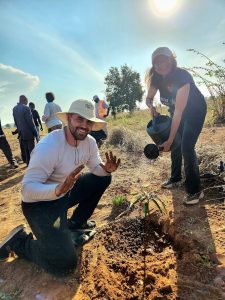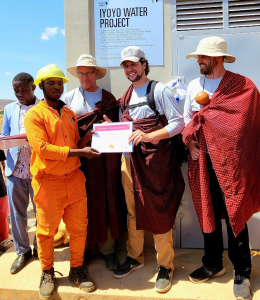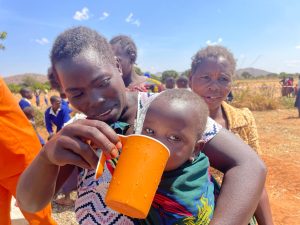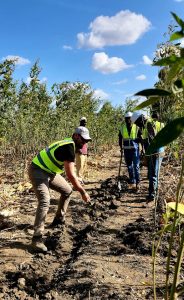As a graduate student at the University of Florida in 2021, Anthony Halcyon saw a local news segment that he credits for changing the trajectory of his academic and humanitarian endeavors as a scientist. It showcased the impactful work of Water 4 Mercy. The Clearwater, Florida-based non-profit organization is dedicated to providing clean water solutions to underserved communities in Africa. This is Anthony’s journey in water security with Water 4 Mercy.

By Anthony Halcyon
Intrigued and inspired by an organization that performs this work, I reached out to founder and fellow Gator, Nermine Rubin. This set forth a series of events that would lead me on an incredible journey. Approximately two years later, on the Water 4 Mercy Donor’s Trip, I would witness the first moment the water taps turned on for the 3,229 members of Iyoyo village in Tanzania’s Dodoma district.
It was a momentous occasion, symbolizing not only access to clean water but also the culmination of relentless efforts to improve the lives of those in need. This was all accomplished through hardworking men and women in Africa. It also took the financial backing of U.S. donors, some of whom are also UF Alumni like me. While ensuring access to clean water is paramount, the organization also prioritizes education and stewardship of water and agricultural resources. This holistic approach distinguishes Water 4 Mercy from conventional humanitarian initiatives. It also fosters a mindset in the sponsored villages that allows them to gain an education, a sense of ownership, and greater autonomy with a critical need like water being addressed.
Community Engagement

Alongside various NGOs, such as Innovation Africa as well as religious organizations, Water 4 Mercy facilitated educational programs. These empowered villagers with technical skills essential for the construction and maintenance of the water delivery system as well as the agricultural applications of these water tower and well projects. This emphasis on capacity building ensures the sustainability of water projects, fostering self-reliance and resilience within communities. This is done through what Water 4 Mercy calls the transformation of the cycle of poverty into “Cycles of Success.” Through education, it implements AITeC (Agricultural Innovation and Technology Centers) with Don Bosco Technical Institutes of Africa to sustain the changes it brings to numerous villages.
Having completed my own graduate program just months prior, I felt a profound sense of fulfillment as I presented certifications of completion to individuals who had undergone these educational programs. It was a testament to the power of knowledge and collective action in effecting positive change. As a scientist, I understood the significance of not only providing resources but also equipping communities with the skills necessary to manage them effectively.
Contributing to the creation of the Iyoyo Village’s Permanent Water System was a crucial moment of fulfillment. It was abundantly clear how important sustainable, clean water is. It also was incredibly fulfilling to see this vital resource become available to them. The journey’s high point came as the village celebrated turning on the water taps for the first time. The community’s happiness and appreciation of having access to a consistent supply of water was a significant and poignant occasion. It also highlights the concrete results of our combined efforts. I will always treasure the memories of hundreds of people chanting “maji,” which is Swahili for “water,” as the people of Iyoyo drank their first glass of water free of deadly germs and typhoid.

Impact Beyond Infrastructure
Water 4 Mercy’s initiatives catalyze a ripple effect of empowerment, fostering community cohesion and economic opportunities. Access to clean water enhances health outcomes, particularly for women and children who often bear the brunt of waterborne diseases. Moreover, it liberates individuals from the arduous task of fetching water, allowing them to pursue education and income-generating activities. Some villagers told me stories that I will never forget – stories like a hyena that also wanted the water attacking them, falling in a large hole at night during a late-night water run and having to wait until morning for rescue, and some villages spending all day digging, sifting, and transporting water.

Reflecting on my journey with Water 4 Mercy, I am reminded of the power of collaboration and collective action in addressing these challenges. By leveraging partnerships with local stakeholders and employing a multifaceted approach, Water 4 Mercy exemplifies the potential for grassroots initiatives to drive meaningful change. As we celebrate the success of the Iyoyo water project, it is imperative to recognize that our work is far from over. The global water crisis persists, affecting millions of lives worldwide. Yet, amidst the challenges, there lies immense opportunity for innovation and compassion.
As I continue my journey as a scientist and humanitarian, I am grateful for the invaluable lessons learned and the relationships forged through this transformative experience. In the pursuit of water security, let us remain steadfast in our commitment to equity, sustainability, and empowerment. Together, we can ensure that every individual has the fundamental right to access clean and safe water, laying the foundation for a more just and equitable world.
Anthony Halcyon received his B.S. degree in Environmental Management in Agriculture and Natural Resources and his M.S. degree in Soil and Water Sciences, both from the UF/IFAS Department of Soil, Water, and Ecosystem Sciences.
The featured image’s inset photo of Anthony in a dry riverbed was provided by Ellen Holmes Steeves-LeBlanc. Mike Loizzo edited and published this blog post.
 5
5
